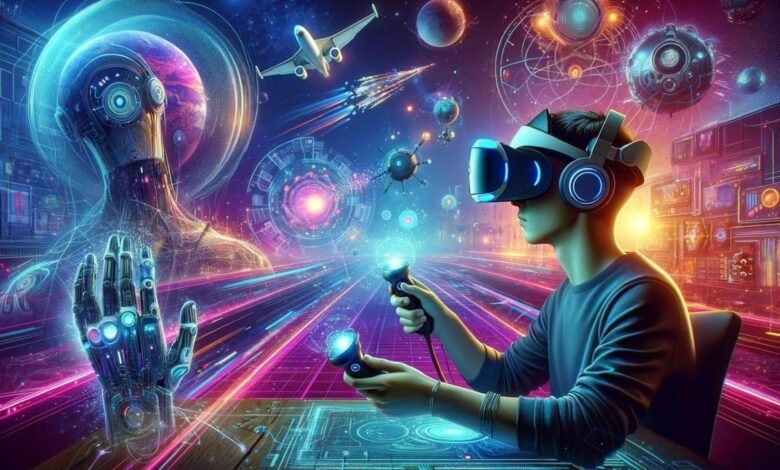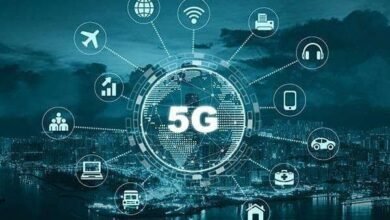Exploring the Metaverse: The Next Digital Frontier

The metaverse, a term once confined to science fiction, is now a rapidly emerging reality poised to redefine how we interact, work, and live in a digital age. Combining virtual reality (VR), augmented reality (AR), blockchain, and artificial intelligence (AI), the metaverse is a shared, immersive, and persistent digital environment where the physical and virtual worlds converge.
As industries, innovators, and users flock to this uncharted territory, the metaverse promises to revolutionize the digital frontier, creating new opportunities and challenges in equal measure.
What is the Metaverse?
The metaverse is a collective virtual shared space, created by the convergence of virtually enhanced physical reality and persistent virtual reality. It’s not a single platform but a network of interconnected digital spaces where users can interact with one another and the environment in real time.
Key elements of the metaverse include:
- Immersion: Users experience the metaverse through VR headsets, AR devices, or even traditional screens.
- Interconnectivity: Seamless transitions between virtual spaces, allowing users to carry digital assets and identities across platforms.
- Persistence: A continuous and evolving world that exists even when users log off.
See also: Quantum Computing: Unlocking New Horizons in Technology
How Does the Metaverse Work?
The metaverse is built on a combination of technologies that work together to create immersive and interactive experiences:
- Virtual Reality (VR): Fully immersive environments that replicate the real world or create entirely new ones.
- Augmented Reality (AR): Overlaying digital information onto the real world through devices like AR glasses or smartphones.
- Blockchain: Ensures secure ownership of digital assets like NFTs (non-fungible tokens) and supports decentralized economies.
- Artificial Intelligence (AI): Powers realistic interactions, virtual assistants, and dynamic environments.
- Cloud Computing: Supports the vast data processing and storage needs of the metaverse.
Applications of the Metaverse
The metaverse is not just about gaming or socializing—it has far-reaching implications across various sectors:
1. Gaming and Entertainment
Gaming is the metaverse’s most mature application, with platforms like Roblox, Fortnite, and Decentraland offering immersive experiences. The entertainment industry is also leveraging the metaverse for virtual concerts, movie premieres, and interactive storytelling.
2. Virtual Workspaces
The metaverse is reshaping the future of work by enabling virtual offices where teams can collaborate in real time. Companies like Meta and Microsoft are already developing virtual productivity tools to enhance remote working.
3. Education and Training
The metaverse can transform education by creating virtual classrooms, interactive simulations, and immersive training programs. From medical training to historical recreations, the possibilities are endless.
4. Retail and E-Commerce
In the metaverse, consumers can virtually try on clothes, test products, and shop in virtual stores. Brands like Gucci and Nike are already exploring this new frontier to connect with younger audiences.
5. Healthcare
The metaverse has the potential to revolutionize healthcare with virtual consultations, therapy sessions, and training simulations for medical professionals.
6. Real Estate
Virtual real estate is becoming a lucrative market, with platforms allowing users to buy, sell, and develop digital land. Investors are betting on the value of virtual properties as the metaverse expands.
Challenges of the Metaverse
While the metaverse offers immense potential, it also presents significant challenges:
- Privacy Concerns: The metaverse will collect vast amounts of data, raising concerns about how user information is stored and used.
- Digital Divide: Access to the metaverse requires advanced technology, potentially excluding those without resources.
- Regulation: Establishing laws and governance for a decentralized virtual space is complex.
- Mental Health Impacts: Prolonged use of immersive environments could lead to social isolation or addiction.
- Security Risks: As the metaverse grows, ensuring the safety of users and digital assets is crucial.
The Role of NFTs in the Metaverse
Non-fungible tokens (NFTs) play a pivotal role in the metaverse by enabling ownership of digital assets like art, music, avatars, and real estate. Blockchain technology ensures transparency and authenticity, making NFTs a cornerstone of the metaverse economy.
The Future of the Metaverse
The metaverse is still in its infancy, but its potential is vast:
- Interoperability: Future metaverses may connect seamlessly, allowing users to navigate between platforms effortlessly.
- Digital Economies: As virtual spaces grow, decentralized economies will thrive, enabling new business models and opportunities.
- Smart Cities: Integration of the metaverse with real-world infrastructure could enhance urban planning and management.
- Cultural Evolution: The metaverse will shape new forms of art, social interaction, and cultural expression.
Conclusion
The metaverse represents the next frontier of digital innovation, offering a universe of possibilities for individuals, businesses, and society at large. While challenges persist, the collaborative efforts of technologists, policymakers, and creatives will determine how this new world unfolds.
As we stand on the brink of this transformative era, the metaverse promises to redefine the way we live, work, and connect—ushering in a future that blurs the boundaries between the physical and digital realms.




